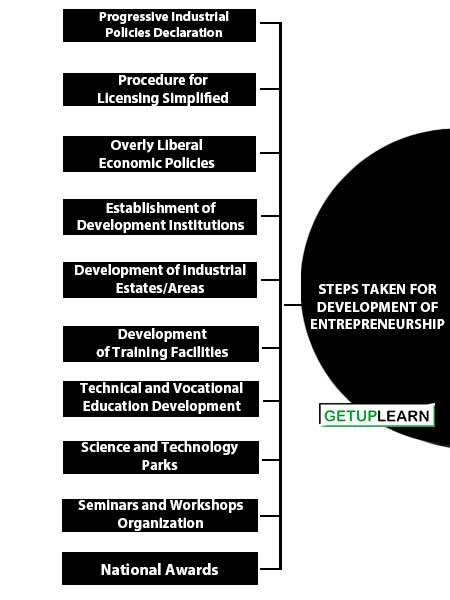Table of Contents
-
1 Steps Taken for Development of Entrepreneurship in India
- 1.1 The Progressive Industrial Policies Declaration
- 1.2 Procedure for Licensing Simplified
- 1.3 Overly Liberal Economic Policies
- 1.4 Establishment of Development Institutions
- 1.5 Development of Industrial Estates/Areas
- 1.6 Development of Training Facilities
- 1.7 Technical and Vocational Education Development
- 1.8 Science and Technology Parks
- 1.9 Seminars and Workshops Organization
- 1.10 Literature Creation
- 1.11 National Awards
- 1.12 Product-Specific Policies Declaration
- 1.13 Establishment of a Unit to Assist Entrepreneurs
- 1.14 Special Plans
Steps Taken for Development of Entrepreneurship in India
The following are the steps taken for the development of entrepreneurship in India:
- The Progressive Industrial Policies Declaration
- Procedure for Licensing Simplified
- Overly Liberal Economic Policies
- Establishment of Development Institutions
- Development of Industrial Estates/Areas
- Development of Training Facilities
- Technical and Vocational Education Development
- Science and Technology Parks
- Seminars and Workshops Organization
- Literature Creation
- National Awards
- Product-Specific Policies Declaration
- Establishment of a Unit to Assist Entrepreneurs
- Special Plans

The Progressive Industrial Policies Declaration
Industrial policies were established by the central government in 1948, 1956, 1980, 1986, and 1991, with adjustments made from time to time. SIDO, National Small Industries Corporation Ltd., Small Industries Extension Training Institution, National Entrepreneurship and Small Business Development Institute, Entrepreneurship Development Institute of India (EDII), and others have been established by the government to achieve policy aims. As a result of all of this, old entrepreneurs have not only begun to work more freely, but they have also begun to benefit from a stable and healthy industrial environment.
Procedure for Licensing Simplified
Only six industries are now required to get government permits. It has been exempted from all other industries. Procedures for acquiring a license and other relevant formalities have been streamlined. Furthermore, the time it takes to receive a license has been significantly decreased.
Overly Liberal Economic Policies
The central government has made its economic policies, such as export-import policy, taxation policy, fiscal policy, and monetary policy, excessively liberal, resulting in the country’s entrepreneurship development.
Establishment of Development Institutions
The Indian government has established a number of development institutions to promote entrepreneurship. Entrepreneurs can get help from organizations like the National Industrial Entrepreneurship Development Centre, the National Entrepreneurial and Small Business Development Institute, the Entrepreneurship Advisory Organization, the State Small Industries Development Corporation, and the Small Industries Service Institute, among others.
Development of Industrial Estates/Areas
In several states, the government has constructed numerous industrial areas/estates where private entrepreneurs have established their businesses. The government has enticed entrepreneurs to set up new businesses in these industrial regions by providing land, transportation, banks, warehouses, water, and power, among other things.
Development of Training Facilities
The government of India, banks, financial institutions, and management institutions have all developed training institutions to conduct training programs to help entrepreneurs develop their skills.
In addition, small industries development organizations (SIDO), small industries service institutes, and district industries centers give entrepreneurs with information on project development, enterprise management, and innovative manufacturing processes, among other things.
Technical and Vocational Education Development
Both the federal and state governments have built technical and vocational education centers where vocational education is provided. Technical and vocational education has been implemented at the school, college, and university levels, where teaching is provided on topics such as entrepreneurial development, entrepreneurial feelings, and facilities and procedures for establishing small businesses, among other things.
The Indian government’s current education policy emphasizes vocational and technical education over the importance of a degree, and open universities have been developed to support this goal. Aside from that, management schools offer vocational education and training in business and industry management.
Science and Technology Parks
Science and technology parks have been built in India to help entrepreneurs develop their businesses. The Indian Industrial Development Bank is working on these parks. The bank has established an entrepreneurial park and industrial parks.
Seminars and Workshops Organization
Entrepreneurial development seminars and workshops are held in India and other nations.
Literature Creation
In the country, seventeen technical advisory groups have generated and published relevant literature for entrepreneurship growth.
National Awards
A national awards program has been established to encourage small business owners.
Product-Specific Policies Declaration
For the development of new and established entrepreneurs, the government has announced product-specific policies. Textile policy, electronic policy, drug policy, and so on are examples.
As a result, entrepreneurs will be encouraged and profited in terms of industry innovations, the use of new commodities, the use of new methods for producing new commodities, and the search for and development of new markets.
Establishment of a Unit to Assist Entrepreneurs
In 1966, the Government of India established an Entrepreneur Unit within the Industries Development Department. The following are its functions:
- This unit assists with the implementation of the Industries (Development and Regulation) Act of 1951, international collaboration, capital goods importation, and the provision of information on foreigners of Indian origin.
- This unit also keeps entrepreneurs updated on the status of their applications.
- This team works to handle entrepreneur issues through several government agencies.
Special Plans
Aside from the self-employment scheme, the government is implementing various other schemes for entrepreneurial development, such as a guarantee scheme for small industries, margin money scheme, rehabilitation of sick units scheme, government purchase scheme, and the scheme for the availability of machinery to entrepreneurs on higher purchase.

